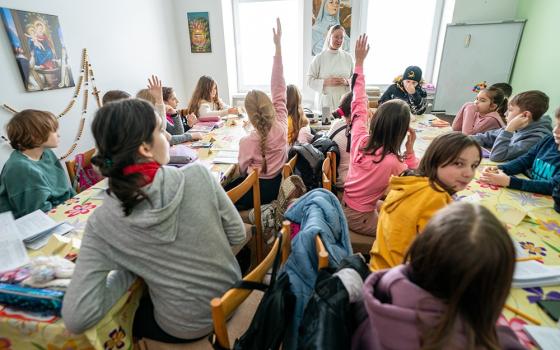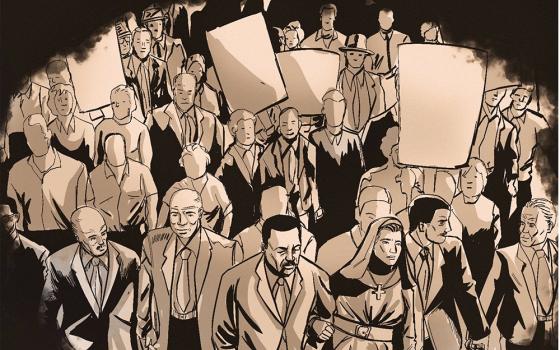Two events are scheduled to take place in Guatemala in January that simultaneously hold the extremes of hope and cynicism that only a country with its tortured history could produce.
A retrial of the former general and president-by-coup Efraín Ríos Montt, 89, on genocide charges, is to be held in secret. The in camera proceeding, should it actually occur, would be the latest in a series of legal maneuvers that began with the conviction of Ríos Montt, now reportedly suffering from dementia, on the same charges in May 2013.
The earlier conviction, quickly reversed on appeal on some technicality, clearly established through days of anguished testimony what the world already knew quite well: Ríos Montt, once a darling of the Reagan administration and assorted U.S. television preachers and adoring evangelical ministers, was an architect of what the United Nations later deemed genocide.
During his brief tenure as president (1982-83), he oversaw a campaign of indiscriminate slaughter of indigenous peoples in the country's highlands. At the same time, he was wont to attend religious rallies, where he would wave his floppy Bible and invoke the name of God.
January also will mark the beginning of a term for newly elected president Jimmy Morales, a comedian and TV performer with no political experience save for the role he played on his own TV show: a peasant who accidentally becomes president. A wave of outrage about official corruption swept this comedian into office.
"The truth will out" seems a fitting end line for the horrific 36-year civil war of which Ríos Montt becomes the defining symbol on the government side. He was but one of a string of bloody dictators that began with the CIA-installed Carlos Castillo Armas in 1954. Light that has begun to burn away the shadows of Cold War activity bares the fact that the U.S. was complicit with that line of dictators, who were responsible for the slaughter of tens of thousands -- perhaps hundreds of thousands -- of Guatemalans.
It appears that Morales is the beneficiary of an overwhelming disgust with government corruption that was unveiled in an investigation by the U.N. International Commission against Impunity in Guatemala, one of the positive outgrowths of the country's violent history. The investigation revealed that former President Otto Pérez Molina, as part of an elaborate conspiracy, received as much as $3.7 million in bribes by importers in exchange for illegal discounts on their customs duty.
Perhaps a page has turned in Guatemalan society. Julio Prato, a lawyer and one of the investigators, told J. Malcolm Garcia, reporting for NCR, "We didn't expect the investigation to go this far up and then to have the protests," in which thousands of middle-class Guatemalans took to the streets demanding change.
"Up to this point, people didn't care about corruption," said Prato. "However, this time was different. We could prove what had happened. People felt as if the government was mocking them. No one had presented a case against the president before."
Whether the change -- from a familiar form of corruption and military control to a comedian pledging reform -- will make a difference is the unknown.
The skeptics have a great deal of evidence on their side. In this matter, the sins of the fathers remain relevant. While signs exist that change is afoot, not least among them the protests and the arrest of the president, vice president and central bank chief for their alleged role in the corrupt scheme, the past weighs heavily on the scales of justice. Guatemala has known very little of justice while having honed corruption and violence to a high art.
Where civil society functions, it does so in the most tentative way. The truth of decades of massacres and of the racism that permeated the assaults on indigenous are not remedied in a peace accord, no matter how profound and well-intended. Hundreds of thousands of internal refugees, displaced from ancient lands, remain marginalized, vulnerable and poor.
The land itself, rich in rain forest timber and minerals, is a magnet for exploitive industries whose clear-cutting and extractive techniques leave little room for consideration of their effects on the country's environment.
The question today is whether Guatemala can overcome the drag of the past. Sociologist Mario Roberto Morales of the University of San Carlos in Guatemala City, said, "Indignation is an emotion and if it isn't developed into a movement with an agenda, it fades away. We need to connect people in the street with existing grassroots movements -- workers' parties, indigenous parties, a united front for all of civil society. If we don't, I don't think the movement will survive."
Making those connections, however, will involve overcoming one of the heaviest weights of the past, the memory of what happened 60 years ago to those who formed such networks in the interests of Guatemalan democracy and culture. The military remains a powerful, if less conspicuous, influence today. Perhaps the images of Ríos Montt at career's end will persuade those who are resistant to the popular will today to take a different path.



